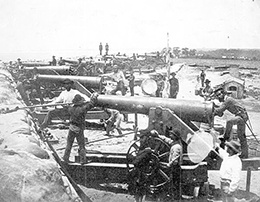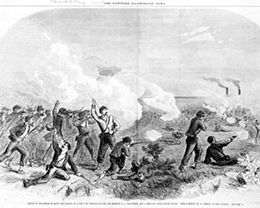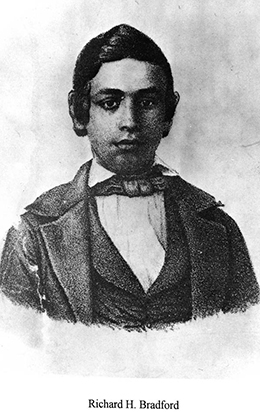Distant Storm: Florida's Role in the Civil War
A Sesquicentennial Exhibit
Florida’s Role in the Civil War
Florida’s Role in the Civil War, 1861-1862
Fighting in Florida
Seven months later, the standoff at Pensacola continued. The Confederacy sent substantial reinforcements to the city. Some 6,000 Confederate troops occupied defensive positions across the harbor from Fort Pickens, where Union troops awaited a Rebel assault throughout the summer of 1861.
The Union forces on Santa Rosa Island, the location of Fort Pickens, numbered about 2,000. During the summer, the Sixth Regiment, New York Volunteers, commanded by Col. Billy Wilson and known as “Wilson’s Zouaves,” reinforced the Union soldiers and sailors at Fort Pickens. Wilson’s regiment dug in on a line east of the fort.
In September, Colonel Harvey Brown, the Union commander of Fort Pickens, ordered raids against Confederate installations across the harbor. The Union destroyed a dry dock as well as the schooner C.S.S. Judah. General Braxton Bragg ordered a retaliatory raid against the camp on Santa Rosa Island.
On the night of October 8, 1861, 1,000 Confederates crossed the harbor, landed on Santa Rosa, and attacked the Union camp. The Confederates overran the camp, but ran into stiff resistance from reinforcements that Col. Brown ordered to engage the Rebels on the morning of September 9.
Brown’s counterattack caught the Confederates off-guard. General Richard H. Anderson, commanding the Confederate raid, ordered his troops to retreat to their boats. The Rebels boarded their transports under Union fire.
The Battle of Santa Rosa Island was the first engagement of any consequence in Florida during the war. The Confederates lost 18 men killed, 39 wounded, and 30 became Union prisoners.
Among the Rebel dead was Captain William H. Bradford of Madison, Florida. He was the first Confederate officer to die in combat on Florida soil during the war. The Union lost 14 killed, 29 wounded and 24 prisoners.
Six weeks before the battle, Alabama soldier J. H. Kirkman wrote to his cousin Ellen Call Long in Tallahassee. Kirkman anticipates a battle. He describes General Bragg’s preparations for the assault on Santa Rosa Island.
J. H. Kirkman to My Dear Cousin, August 24, 1861 (M92-1, Call and Brevard Family Papers)

Camp Yancy
Warrington FLa
Aug 24th 1861
My Dear Cousin
I received a few days since your most welcome, interesting, and to me, unexpected letter. I hope you will excuse my delay in responding. But we are at present very busy in repairing our batteries, one of which leaked so badly that our powder in the magazine was rendered unfit for use. We also for the last four or five days, have been drilling nearly all day at Battalion Drill at double quick and after being so busy all day when night comes I am so exhausted in body that I haven’t the energy to use the mind. But as soon as roll call is over, retire to my hammock and am soon dreaming of battles and the loved ones at home. There is a rumor current here and generally credited that we are to fight here in ten days or
[end Page 1]
two weeks. Our reasons for thinking so are very good ones. He (Gen. Bragg) is letting those who are unfit for duty have discharges and furloughs. A surgeon applied a few days since for a furlough, he was refused, and told, that, in twenty days every surgeon in the Army here, would be needed. But if he wasn’t needed at the expiration of that time, he might have gone for any length of time he wished. He also refuses the well and officers when they apply. There is to be an inspection of the whole of the forces here on the 30th. Some suppose to select the best drilled Regiments to be the storming party. Ergo, we are exerting ourselves to the utmost as we wish to be selected. There is to be a Mississippian shot here next month, for killing a Sergeant whilst in the discharge of his duty. I am expecting, everyday, an order from the Sec of War to proceed to Virginia to join McFarland’s [Captain Robert McFarland] company in the 4th Ala Regt, whither I am very anxious to be transferred. But intend remaining here to participate
[end Page 2]
soon and then proceed to Virginia as I wish to be at the taking of Washington City. I do hope they will fight here soon, as I am very tired waiting for one. If I go to Virginia I will seek out cousin Mary’s husband, Give my love to all the family and ask cousin Mary to write to me. With many thanks for the interest you manifest for my welfare and your many kind offers I remain
Your Aff Cousin
J. H. Kirkman
The Confederacy’s inability to capture Fort Pickens demonstrated the importance of naval power in the Civil War: the Rebels could not capture Union strongholds that could be supplied and reinforced by sea or river. Florida, however, tried to deploy its limited naval strength to the best effect. An unofficial coast guard appeared in coastal communities across the state.
In May 1861, the militia in Hernando County organized a coast guard at Bayport to patrol the Gulf of Mexico between Cedar Keys and Anclote Key. Militia General Joseph Taylor warned the coast guard to beware of “Key Westers” on the coast. Since Key West remained in Union hands throughout the war, the presence of refugees or sailors from the island might arouse the suspicions of loyal Confederates.
Brigadier General Joseph M. Taylor to Cyprian T. Jenkins, May 22, 1861
(Series 43, Territorial and State Military Expenditures, 1839-1869)

Cyprian T Jenkins
Sir
You will please fit out your sloop for sea and in addition to your crew take on board Stapleton, Brown, and Stephens Peterson, or any other three men that I may send. You will cruise between An Kylote [Anclote Key] and Cedar Keys and report to the officer in command at Bay Port the appearance of any suspicious craft her bearings etc. If a sailing vessel your report is expected to be accurate in description but if a steamer you will immediately sail to and report at Bay Port unless you know that she is not a foe. You may observe the Key Westers closely but do not molest them unless they commit some overt act. I regard their presence on the coast with no degree of favor. You have force enough and you can have a detachment from this point to compel suspicious vessels from departing without leave. The State needing your services is amply able to pay you. For the hire of your sloop and men and self I will give you eighty dollars a month. This amount is deemed sufficient. I shall ration my own men aboard. You will also carry news and men when required. You must
[end Page 1]
not change your crew without notifying me personally.
Joseph M. Taylor
Brigadier General
Florida Militia
Brooksville May 22, 1861
Order of Brig Genl Taylor

 Listen: The World Program
Listen: The World Program


